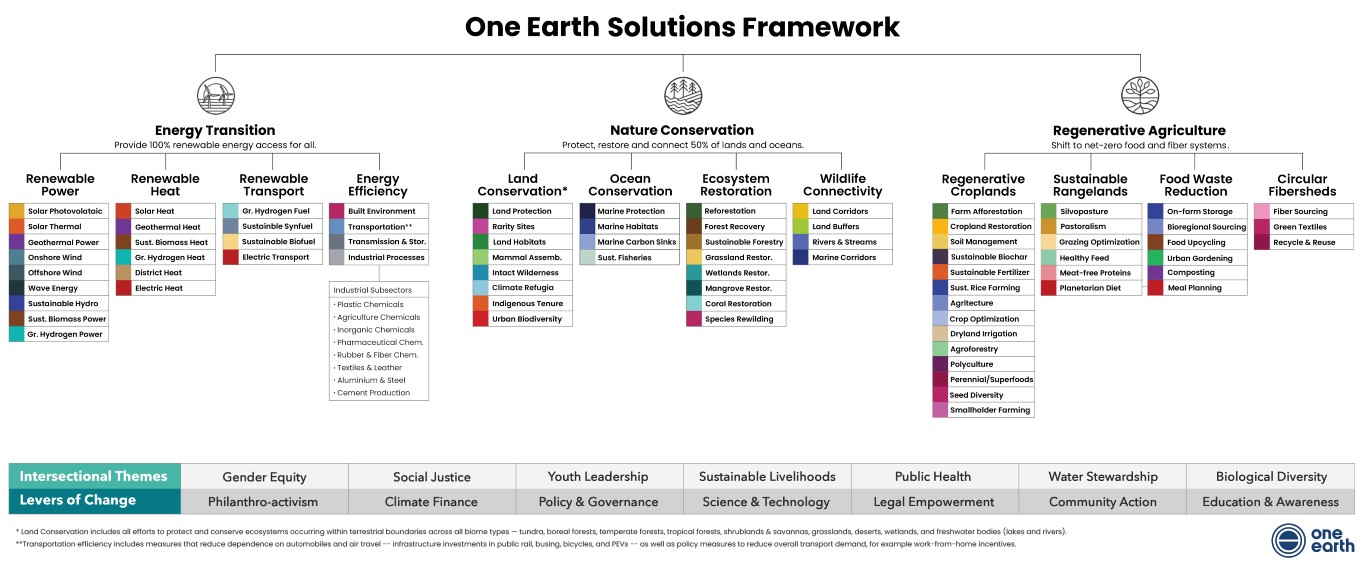Environmental & Climate Protection
Major Environmental Goals
Environmental Protection
and Climate StabilityProtecting our Natural Resources
of air, waters, forests and
other essential ecosystemsProtecting Biodiversity, along with
endangered wildlife and their habitatsProtections against environmental pollution and degradation of the air, waters, and land
Protect special areas of natural beauty, scenic landscapes, and sacred lands
Reduce human causes of climate change and initiate reversing measures
-
Conservation of:
- freshwater and ocean ecosystems
- biodiversity of plants, crops and seeds
- wildlife, habitats, and areas of beauty
- rare and useful mineral resources
-
Invest in:
- improving agricultural soil
- forest management and reforestation
- ecosystem & landscape restoration
- diverse plants and seed conservation
- nature-reserves for wildlife and birds
- conservation and rehabilitation of regional ecosystems and biodiversity
- managing ecosystem resources with
nature-based solutions

-
International Agreements:
- Boldly move forward to implement
the Paris Climate Agreement, while seeking international agreement to be more courageous in its goals - Seek international agreements for protecting our globally shared resources; such as the air, the oceans, regional waterways, significant forests and other important ecosystems
- Effective measures for protecting global resources; such as economic penalties for violations and economic incentives for improvements
- Boldly move forward to implement
Monitor & Protect the Environment
- Monitor and protect all types of globally shared natural resources, along with all types of animal and plant biodiversity
- Monitor and protect the global atmosphere, ozone, and air quality
- Monitor and protect the oceans and rivers
- Monitor and protect our drinking water
- Monitor and protect the forests, jungles, mountains, plains, and wild lands
- Monitor and protect endangered wildlife
- Monitor and mitigate climate change
and extreme weather - Monitor the sources of carbon emissions
- Monitor air quality and toxic chemicals
- Monitor ocean-warming, acidification, ocean pollution, trash, micro-plastics, overfishing, harmful fishing practices,
and degradation of ocean ecosystems. - Create guidelines and best practices for sustainable fishing, sustainable agriculture, and ethical animal farming.
- Seek international agreements for global environmental protections, and agree on global economic penalties and incentives to achieve these protections.
Let's protect our Planet
and save the precious wildlife !

Also See...
The Economic Value of Biodiversity
(and Nature-based Solutions)
See this Comprehensive Outline of Solutions
(from
OneEarth.org/solutions)
(click the image below)
Environmental Accountability
Environmental accountability means to be transparent and accountable for all Environmental Costs involved in:
- producing and using a product
- using or depleting a natural resource
- disrupting global climate patterns
- disposing industrial and consumer waste
These costs need to be accounted for and
paid for by the businesses (or government agencies) that cause these environmental damages or depletions, due to their products, services or activities.
The environment commons, which includes our air, waters, public lands, important ecosystems and the biodiversity of plants
and animals, can all be protected by Laws
– but these laws need to be enforced by financial penalties or special taxes.
In addition, the environmental costs of dealing with non-recyclable consumer waste needs to be paid for by those consumers. This can be implemented by either a penalty, a tax, or a waste-disposal fee.
Another extremely important environmental problem is Climate Change, due to excessive carbon-emissions going into the atmosphere. Most environmental economists believe that this problem can be solved by a Carbon-Tax imposed on industries who either directly emit carbon-waste in their production processes or produce carbon-emitting products.
Reversely, 'economic incentives' can be given to businesses or community projects that:
- use environmentally-sustainable energies and production processes.
- help to heal the environmental harm already incurred on air, waters, or land.
- recycle domestic or industrial waste, or transform environmentally harmful substances into usable energy or products.
These economic incentives can be in the
form of specific tax-breaks, direct payments, or interest-free business loans given to businesses or community projects that are non-polluting, low carbon-emitting, energy-efficient, or effectively recycling.
In other words, economic incentives are given for producing products and supplying services that help reduce toxic pollution and carbon emissions, or improve ecosystems and carbon capture.
Climate Solutions
Urgently implement and monitor the
Paris Climate Agreement to mitigate
the causes of global climate-change,
then seriously improve on its goals.Adopt a whole-system approach
by linking climate laws and taxes
to other environmental agreements, protocols, and conventions.Internationally agree on global penalties for environmental and climate violations, which can be payed into a globally supervised Environmental-Climate Fund that will distribute low-interest loans to green-clean businesses and production, renewable energies, and innovative solutions to global climate-change and environmental pollution.
Climate Solution: Pricing Carbon
What is Pricing Carbon
Methods of Pricing Carbon
What is a Carbon-tax?
Why a Carbon-tax?
Carbon-tax vs. Cap-and-trade
What is Carbon Trading?
Smart Tax vs Blunt Tax
Public-Private Solutions
Low-income Tax-credits & Rebates
Argument against Carbon-pricing
Carbon-offsetting- Not Good Enough
Environmental Sustainable Economics
Building an Inclusive Green
Economy
Ways to practice Sustainability
Sustainable Agriculture
Ecological Economics
Video on Ecological Economics
Steady-state Economics
100+ Environmental Groups
Green Economic News & Blogs

